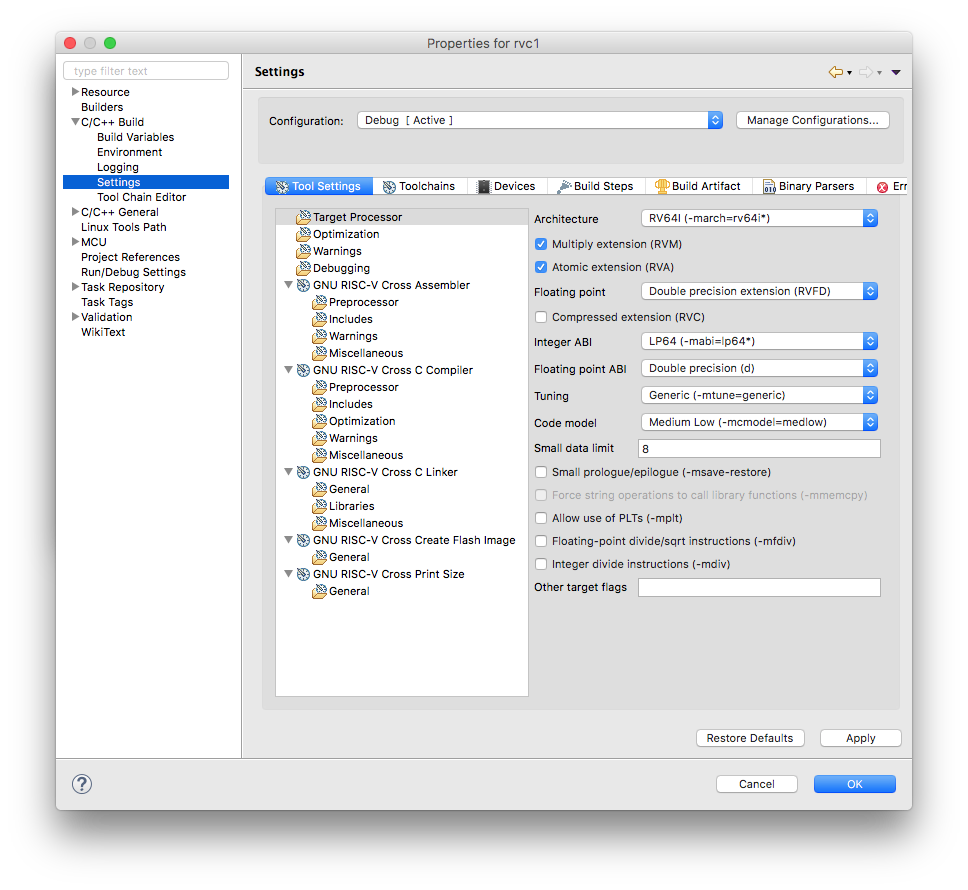DEPRECATED > The RISC-V Embedded GCC
Contents |
Deprecation notice
In mid-2019, the RISC-V toolchain binaries were moved from the GNU MCU Eclipse project to the xPack project. The new page is:
All previous releases are still available in the @gnu-mcu-eclipse scope,
but were deprecated and are not recommended for new projects.
Overview
The GNU MCU Eclipse RISC-V Embedded GCC is an elaborated binary distribution that follows the official RISC-V distribution maintained by SiFive.
riscv64-unknown-elf-gcc?
Actually the long question is riscv64-unknown-elf-gcc vs riscv32-unknown-elf-gcc?
With lots of architectures and systems supported, GCC recommends prefixing the binaries with a unique tuple:
<arch>-<vendor>-<os>-<libc/abi>-
The current RISC-V prefixes for the Linux toolchains are riscv64-unknown-linux-gnu- and riscv32-unknown-linux-gnu- and for the non-Linux toolchains are riscv64-unknown-elf- and riscv32-unknown-elf-.
Well, don’t be confused by this unfortunate names. The 64 or 32 prefix attached to the architecture does not mean that the toolchain runs on 64-bit or 32-bit platforms only. It does not mean either that the compiler produces 64-bit or 32-bit RISC-V binaries. Actually, the compilers produce both 32/64-bit binaries, based on -march and -mabi. The only difference are defaults, when the compiler are invoked without the -march and -mabi explicitly set on the command line.
The unknown part of the tuple also does not bring any useful information. If it refers to the OS, it could have been easily skipped. Not to mention that for bare metal toolchains, none would have been a shorter and more usual name.
riscv-none-embed-gcc
So, giving away the confusing parts, a more appropriate prefix for the multilib toolchain dedicated for bare-metal embedded applications would have been:
riscv-none-embed-
To reduce confusion, and to differentiate from the riscv64-unknown-elf-gcc which is tightly coupled with a libgloss implemented with kernel traps, the GNU MCU Eclipse RISC-V Embedded GCC toolchain, starting with the 7.2.0-1-20171109 release adopted this name.
-march and -mabi
The RISC-V design is not a single architecture, but a family of architectures, with optional components, identified by letters.
RISC-V ISA strings begin with either RV32I, RV32E, RV64I, or RV128I indicating the supported address space size in bits for the base integer ISA.
- RV32I: A load-store ISA with 32, 32-bit general-purpose integer registers.
- RV32E: An embedded flavor of RV32I with only 16 integer registers.
- RV64I: A 64-bit flavor of RV32I where the general-purpose integer registers are 64-bit wide.
In addition to these base ISAs, a handful of extensions have been specified. The extensions that have both been specified and are supported by the toolchain are:
- M - Integer Multiplication and Division
- A - Atomics
- F - Single-Precision Floating-Point
- D - Double-Precision Floating-Point
-
C - 16-bit Compressed Instructions
- G - General, a shortcut to IMAFD
RISC-V ISA strings are defined by appending the supported extensions to the
base ISA in the order listed above. For example, the RISC-V ISA with 32,
32-bit integer registers and the instructions to for multiplication would
be denoted as “RV32IM”. Users can control the set of instructions that GCC
uses when generating assembly code by passing the lower-case ISA string to
the -march GCC option: for example -march=rv32im.
For more details, please see The RISC-V Instruction Set Manual, Volume I: User-Level ISA, Document Version 2.2.
In addition to controlling the instructions available to GCC during code generating (which defines the set of implementations the generated code will run on), users can select from various ABIs to target (which defines the calling convention and layout of objects in memory). Objects and libraries may only be linked together if they follow the same ABI.
RISC-V defines two integer ABIs and three floating-point ABIs, which together are treated as a single ABI string. The integer ABIs follow the standard ABI naming scheme:
-
ilp32: “int”, “long”, and pointers are all 32-bit long. “long long” is a 64-bit type, “char” is 8-bit, and “short” is 16-bit. -
lp64: “long” and pointers are 64-bit long, while “int” is a 32-bit type. The other types remain the same as ilp32.
while the floating-point ABIs are a RISC-V specific addition:
- ”” (the empty string): No floating-point arguments are passed in registers.
-
f: 32-bit and smaller floating-point arguments are passed in registers. This ABI requires the F extension, as without F there are no floating-point registers. -
d: 64-bit and smaller floating-point arguments are passed in registers. This ABI requires the D extension.
Just like ISA strings, ABI strings are concatenated together and passed via
the -mabi argument to GCC. For example:
-
-march=rv32imafdc -mabi=ilp32d: Hardware floating-point instructions can be generated and floating-point arguments are passed in registers. This is like the-mfloat-abi=hardoption to Arm’s GCC. -
-march=rv32imac -mabi=ilp32: No floating-point instructions can be generated and no floating-point arguments are passed in registers. This is like the-mfloat-abi=softargument to Arm’s GCC. -
-march=rv32imafdc -mabi=ilp32: Hardware floating-point instructions can be generated, but no floating-point arguments will be passed in registers. This is like the-mfloat-abi=softfpargument to Arm’s GCC, and is usually used when interfacing with soft-float binaries on a hard-float system. -
-march=rv32imac -mabi=ilp32d: Illegal, as the ABI requires floating-point arguments are passed in registers but the ISA defines no floating-point registers to pass them in.
The GNU MCU Eclipse RISC-V plug-in supports all current options, and reserves some for near future use.

However, please be aware that not all possible combinations have libraries available.
Multiple libraries
Due to the large number of architectures and ABIs defined for RISC-V, not all possible combinations are actually available.
The current list is:
march=rv32i/mabi=ilp32
march=rv32im/mabi=ilp32
march=rv32iac/mabi=ilp32
march=rv32imac/mabi=ilp32
march=rv32imafc/mabi=ilp32f
march=rv64imac/mabi=lp64
march=rv64imafdc/mabi=lp64d
(the actual list is defined in this file).
